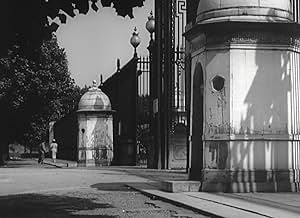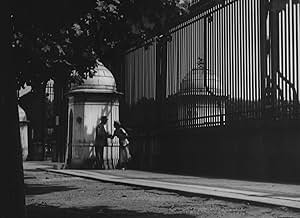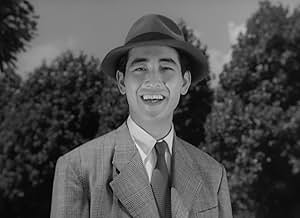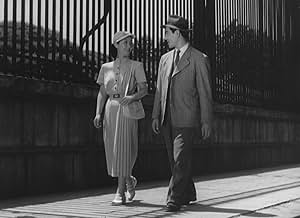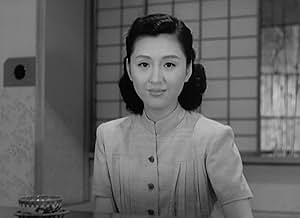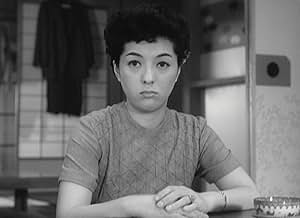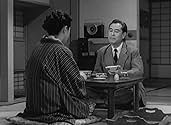IMDb RATING
7.6/10
4.1K
YOUR RATING
A childless middle-aged couple faces a marital crisis.A childless middle-aged couple faces a marital crisis.A childless middle-aged couple faces a marital crisis.
- Awards
- 1 win total
- Director
- Writers
- All cast & crew
- Production, box office & more at IMDbPro
Featured reviews
Japanese master Yasujiro Ozu made this 1952 film between two masterpieces, Early Summer and (especially) Tokyo Story, and this film suffers a bit by comparison with them. As in other (somewhat more accomplished) movies by Ozu (one thinks especially of the superb Late Spring) the plot deals on the issue of whether a young woman should marry, and if that marriage should be a love marriage or arranged one. There is a middle aged, childless couple, the snobbish, nasty Taeko (Michiyo Kogure) and her husband, the honest, good but a bit dull salary man Satake (Shin Saburi). Her nephew, the pretty young Setsuko (Keiko Tsushima) comes to visit, she has to go to an interview for an arranged marriage, but seeing the loveless marriage between Taeko and Satake, and how she mocks him behind his back, is not very interested.
Ozu's best films haven't dated a bit, but this one has somewhat. Moreover, while I don't agree with the generalization that all of Ozu's films are slow (not all of them are), this one is on the leisurely paced side. What's more, the movie takes some time to develop its plot so it does require a bit of patience from the viewer. You will eventually warm up to this movie, I think, but not immediately.
On the plus side, it is a good, interesting movie, with believable, well developed characters. Chishu Ryu, Chikage Awashima and Kumiko Mikaye (all regular of many Ozu films) have bit roles here.
Ozu's best films haven't dated a bit, but this one has somewhat. Moreover, while I don't agree with the generalization that all of Ozu's films are slow (not all of them are), this one is on the leisurely paced side. What's more, the movie takes some time to develop its plot so it does require a bit of patience from the viewer. You will eventually warm up to this movie, I think, but not immediately.
On the plus side, it is a good, interesting movie, with believable, well developed characters. Chishu Ryu, Chikage Awashima and Kumiko Mikaye (all regular of many Ozu films) have bit roles here.
Another sensitive Ozu film about family. In this one, a somewhat upper-class woman resents her more simple, middle-class husband (by arranged marriage), while also encouraging her niece to go to arranged marriage meetings. As always with Ozu, I found an awful lot to like about this movie, but I wasn't quite enamored enough to gush over it. Most of the core cast is superb, although it's not Ozu's usual team (Setsuko Hara is nowhere to be seen, although Chishu Ryu and Chikage Awashima have minor roles). Michiyo Kogure might be a little too nasty, but I have to say it's kind of refreshing to see a less restrained character in an Ozu film. Perhaps the film wraps up too nicely and neatly, going too obviously for a touching moment, but I wouldn't say it's entirely unwarranted. At any rate, I enjoyed the film with its insights and gentle humor.
Michiyo Kogure is discontented with her long marriage to Shin Shiburi. She refers to him as "Mr. Obtuse" to her female relations and friends, and talks them into going on holiday with her, claiming to him that her niece, Keiko Tsushima, is at the resort, suffering from appendicitis; she's probably scared and lonely; and then Miss Tsushima walks in. Miss Tsushima is also a problem. Like many an Ozu woman, she doesn't want to get married yet, and certainly doesn't want an arranged marriage like her aunt. It's so primitive.
It all comes to a head one evening when he's enjoying rice with green tea and his wife doesn't like that way of eating it. He tries to explain that he likes simple, primitive, informal things, like cheap cigarettes and third-class railway tickets and pachinko machines. He understands she likes the 'better' things, and that's fine. And he won't pour tea on his rice any more. Her response is to walk out of the room.
I decided most of the way through that this was Ozu's variation on THE TAMING OF THE SHREW, without any of Petruchio's cruelty.... at least on the part of Mr. Shiburi. The studied cruelty is exhibited, in truth by Miss Kogure. There's not a cruel bone in Shiburi's body. He tries to get his niece to do the right thing simply by talking. He's remembered fondly by a member of his old army squadron as kind; he's sponsoring Kôji Tsuruta for a job at his company because he's the brother of an old high-school friend who got killed in the war. Perhaps Kate is a combination of Miss Kogure and Miss Tsushima.
The transformation of Ozu's style from before the war is almost complete. Gone are the American movie posters, although there's some discussion of a Jean Marais film; and the camera sticks pretty close to the floor, although there is one pull-in at the end of a scene, after the players have left. I'm not sure what that is supposed to mean.
It all comes to a head one evening when he's enjoying rice with green tea and his wife doesn't like that way of eating it. He tries to explain that he likes simple, primitive, informal things, like cheap cigarettes and third-class railway tickets and pachinko machines. He understands she likes the 'better' things, and that's fine. And he won't pour tea on his rice any more. Her response is to walk out of the room.
I decided most of the way through that this was Ozu's variation on THE TAMING OF THE SHREW, without any of Petruchio's cruelty.... at least on the part of Mr. Shiburi. The studied cruelty is exhibited, in truth by Miss Kogure. There's not a cruel bone in Shiburi's body. He tries to get his niece to do the right thing simply by talking. He's remembered fondly by a member of his old army squadron as kind; he's sponsoring Kôji Tsuruta for a job at his company because he's the brother of an old high-school friend who got killed in the war. Perhaps Kate is a combination of Miss Kogure and Miss Tsushima.
The transformation of Ozu's style from before the war is almost complete. Gone are the American movie posters, although there's some discussion of a Jean Marais film; and the camera sticks pretty close to the floor, although there is one pull-in at the end of a scene, after the players have left. I'm not sure what that is supposed to mean.
This film mines much of the territory of Ozu films, including the complex relationships of the major characters, the resistance of a young lady to agree to an arranged marriage and the aesthetics of everyday living amongst the working classes. The film has two main stories, parallel to each other, running through it: Takeo, who is bored with her husband who is very simple in his needs, lies to him so she can go to a spa with her friends. Their niece, the pretty Setsuko, is the one who is resisting the arranged marriage meeting. How the two stories bisect is typical Ozu, creating conflict and anger. This film is not as good as much of Ozu's output at the time, but that includes "Tokyo Story", "Early Summer" and "Late Spring", which are standout classics. The great Setsuko Hara is not in this film and the equally great Chishu Ryu is a bit player, but I think you'll still find this film worthy of your time. If you haven't seen an Ozu film, start with "Tokyo Story" or "Late Spring" (others too, including "Good Morning" and "Autumn Afternoon") but give this a try. I don't think you will be disappointed.
Its about a rich family and arranged marriages. Taeko is in an arranged marriage which is not so successful, they communicate very badly and she lies to get out and do fun things with her friends. For her it is easy to lie to the husband as she thinks he is very stupid. Her niece don't want to go on a arranged marriage meet, but decide for herself who she wants to marry probably a sign of the times, the transition from traditional to modern Japan. In other ways also the modern is juxtaposed with the traditional, they wear kimonos as naturally as western style clothes. And her sister is working in a top position as a designer.
As another IMDb reviewer said this is most interesting because of the charming characters. The elegant, but a bit arrogant and selfish Satake Taeko (Kogure Michiyô) had me spellbound from beginning to end. All characters are interesting and the interaction and communication between them make up the movie.
The city itself takes up a small role in the movie as well, something I like a lot. Editing also is very clever at times. Its never ordinary or dull.
As another IMDb reviewer said this is most interesting because of the charming characters. The elegant, but a bit arrogant and selfish Satake Taeko (Kogure Michiyô) had me spellbound from beginning to end. All characters are interesting and the interaction and communication between them make up the movie.
The city itself takes up a small role in the movie as well, something I like a lot. Editing also is very clever at times. Its never ordinary or dull.
Did you know
- TriviaAt the start of the film, two characters mention going to see a new film with Jean Marais. The film was most likely Orphée (1950), which was released in Japan in June 1951.
- Quotes
Taeko Satake: Think well before you pick your groom, it's important.
- ConnectionsFeatured in David Bordwell on 'The Flavor of Green Tea Over Rice' (2019)
- SoundtracksLove's Old Sweet Song
Composed by J.L. Molloy (as James Lyman Molloy)
- How long is The Flavor of Green Tea Over Rice?Powered by Alexa
Details
- Release date
- Country of origin
- Language
- Also known as
- The Flavor of Green Tea Over Rice
- Filming locations
- Production company
- See more company credits at IMDbPro
- Runtime1 hour 56 minutes
- Color
- Sound mix
- Aspect ratio
- 1.37 : 1
Contribute to this page
Suggest an edit or add missing content

